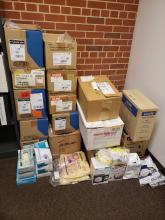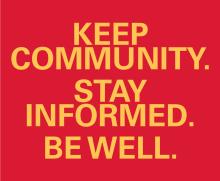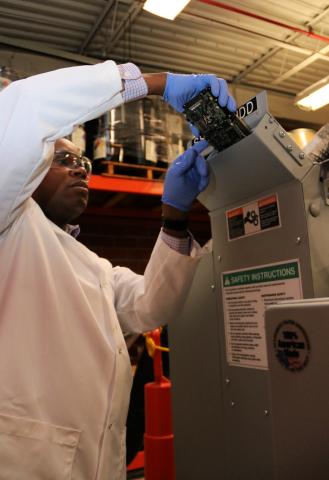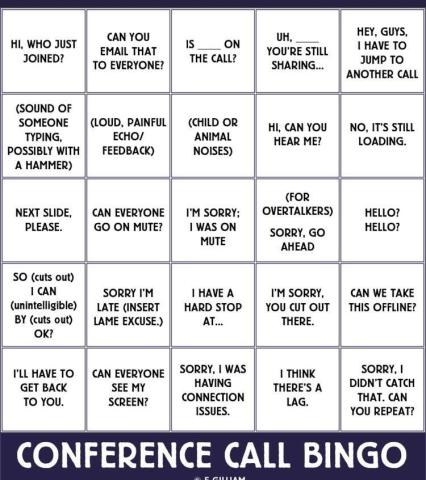
Inside this issue:

Lab moves to telework in response to coronavirus pandemic
As coronavirus spread to the U.S. and concern grew over the severity of the pandemic, Ames Lab worked in partnership with Iowa State University and the Department of Energy emergency response teams to move approximately 85 percent of its total workforce off campus to telework. On Tuesday, March 17, Iowa Governor Kim Reynolds issued a State of Public Health Disaster Emergency. By Wednesday, March 18, the buildings were unoccupied except for minimal operations and research staff.
“Laboratory staff pulled off a massive change in the way we do business in just a few short weeks,” said Chief Operations Officer Steve Hamilton. “This was not easy; we will continue to see changes as the situation develops. But everyone’s hard work and flexibility has paid off in terms of addressing the public health threat and continuing to operate.”
The University has moved all academics to an online format through the Summer 2020 term, and will continue a maximized telework status for faculty and staff until further notice; the laboratory will also continue operations under the maximized telework strategy. It is the first time in both University and Laboratory history that a facility closure of this magnitude has occurred.
Lab collects PPE for the front lines of pandemic
The rapid pace of the pandemic caused medical supply shortages, both nationwide and locally. Lab facilities and custodial staff inventoried and gathered surplus N95 masks, nitrile and latex gloves, and tyvek protective apparel to prepare for a call for donations.
The DOE is coordinating donations at the department level, so that surplus supplies from one DOE/NNSA site would go to a shortage at another site before donation to external entities.
If you have PPE in your unit to donate, please contact Doug Hoenig at hoenig@ameslab.gov.
Virtually creative ways to connect
Iowa State’s Student Wellness Center has created a central digital location for resources, stra tegies, and tips to manage stress and communicate well during remote work, social distancing, and online instruction at Iowa State University. Resources are broad ranging, from work-from-home strategies to mental health care contacts to online concerts, tours, and exercise programs.
tegies, and tips to manage stress and communicate well during remote work, social distancing, and online instruction at Iowa State University. Resources are broad ranging, from work-from-home strategies to mental health care contacts to online concerts, tours, and exercise programs.
Keep Community. Stay Informed. Be Well.

Thank you to on-site staff
Ames Laboratory custodial and guard staff work hard to make sure our facilities are clean and safe. During our normal routines it is perhaps too easy to overlook or take for granted the work that they do; but these are not normal times. Laboratory leadership and all personnel express deep appreciation for our custodial staff and guards, who are shouldering additional burdens due to the COVID-19 pandemic. Ames Laboratory is grateful to you for your service. It is not invisible; your work here matters very much to the rest of us, especially during this challenging time. Thank you!
Workplace Hygiene and Cleanliness
For those of you who remain on site for essential services or research, please continue to practice vigilant hygiene and workplace cleanliness practices to prevent transmission of the virus.
Hygiene
- While at work and in public places, maintain six feet of distance between yourself and others.
- Cover your nose and mouth with tissues when you cough or sneeze.
- Wash your hands often with soap and water, especially after coughing or sneezing, and use alcohol-based hand sanitizers.
- Avoid touching your eyes, nose, and mouth to avoid spreading germs.
- Improve your immune system by getting enough rest, exercising, and eating healthy.
- Stay home if you are sick, and avoid close contact with those who are sick.
Cleanliness
- Provide disposable wipes so that commonly used surfaces (for example, doorknobs, keyboards, remote controls, desks) can be wiped down by employees before each use.
- Routinely clean all frequently touched surfaces in the workplace, such as workstations, countertops, and doorknobs. Use the cleaning agents that are usually used in these areas and follow the directions on the label.
- No additional disinfection beyond routine cleaning is recommended at this time.
As the spread of COVID-19 has continued in Iowa and around the world, we would like to share some updated information on self reporting that will assist Ames Laboratory in efforts to help protect our workforce.
If you are sick:
Notify your supervisor you are sick (fever, cough, shortness of breath) or have known COVID-19, and enter time off in Workday. Visit the UHR website for additional information and resources related to COVID-19 leave, and reach out to humanresources@ameslab.gov with questions.
Self Reporting COVID-19 to Ames Laboratory
If you are awaiting or have received test results for COVID-19, please follow your healthcare provider and/or local public health guidance. They will provide information on home isolation, monitoring of symptoms, infection control practices, and preventing the spread of COVID-19.
Supervisors should notify Human Resources as soon as possible via email; humanresources@ameslab.gov.
Human Resources will facilitate confidential notification with Ames Laboratory Occupational Medicine.
Although we cannot disclose the individual’s identity, Occupational Medicine will work with local public health to determine whether there are any contacts at the Laboratory who need to be notified.
Ames Lab Facilities will be alerted to close affected areas for at least 24 hours, and then will coordinate cleaning and disinfection.
Following disinfection, offices and lab spaces will be assessed for risk prior to re-entry.
Returning to work after COVID-19 or cold/flu-like illnesses
Employees who become ill can return to work following these guidelines:
- You have had no fever for at least 72 hours; AND
- Other symptoms have improved (cough, shortness of breath), AND
- At least 7 days have passed since your symptoms first appeared.
- Prior to your return to work, please contact Occupational Medicine for consultation at 515-294-2056 or by email om@ameslab.gov.
Salaried Effort Certification in Workday
The effort certification process, owned by Sponsored Programs Accounting (SPA) at the university-level, helps maintain compliance with federal regulations that stipulate institutions must have a system of internal control which provides reasonable assurance that salary charges are accurate, allowable and properly allocated to federal awards.
The salaried effort certification for the period of July 1, 2019 – December 31, 2019 will be performed in Workday beginning March 30, 2020. Individuals paid on a monthly basis on federal, federal flow-thru or cost share commitment towards a federal or federal flow thru award will receive an effort certification action in Workday. Please review this Workday action and reach out to Jake Irving (irving@ameslab.gov) if you have any questions.
A job aid for salaried effort certification is available. For more information about effort reporting, please consult the Handbook for Effort Reporting.
CMI's new hard drive shredder serves up plenty of recycling  material for research
material for research
Research into recovery of rare-earth materials from electronic waste by the Critical Materials Institute (CMI) at Ames Laboratory is getting a boost with the purchase of an industrial shredder than can quickly turn obsolete hard drives into a mound of pulverized scrap. The Allegheny SelectShred commercial hard drive shredder, funded by the Iowa Board of Regents, will handle both hard disk drives and solid state drives at a rate of up to 2,700 drives per hour.
The researchers have a ready supply of hard drives – a pallet full in fact – from Ames Laboratory’s Information Technology department. Shredding the hard drives actually provides the Lab a valuable, up-to-date method for disposing of hard disk drives, compared to the hole-punch and off-site recycling method previously used. Read More
 Wellness Note: COVID-19 stressing you out?
Wellness Note: COVID-19 stressing you out?
The coronavirus pandemic is proving to be stressful; fear and anxiety about a disease can be overwhelming and cause strong emotions in everyone. While each person reacts differently to difficult situations, taking care of yourself, your friends, and your family can help you cope with stress. Helping others cope with their stress can also make your community stronger.
During these times it may feel like you have little control in what is going on around you. Something as simple as keeping a sense of routine might help make you feel better. Other things you can do to support yourself:
- Take breaks from watching, reading, or listening to news stories, including social media. Hearing about the pandemic repeatedly can be upsetting.
- Take care of your body. Take deep breaths, stretch, or meditate. Try to eat healthy, well-balanced meals, exercise regularly, get plenty of sleep, and avoid alcohol and drugs.
- Make time to unwind. Try to do some other activities you enjoy.
- Connect with others. Talk with people you trust about your concerns and how you are feeling.
- People with preexisting mental health conditions should continue with their treatment and be aware of new or worsening symptoms.
- The CDC also has several links to useful information about coping and managing stress during this time.
- The Iowa Department of Public Health also has some tips to cope with the stress related to COVID-19.
Remember that it is okay to reach out and ask for help; mental health is just as important as physical health. Call your healthcare provider if stress gets in the way of your daily activities for several days in a row.
- The staff at Employee & Family Resources (EFR) are still fully operational and stand ready to help anyone with concerns. It is also important to note that they can help address other issues that lead to anxiety like child care assistance recommendations, elder care assistance, and financial concerns related to the market downturn and what that means for people’s futures. You can reach out to EFR via phone at 800-327-4692
- Another great resource is the National Alliance on Mental Illness, NAMI. There is a link to frequently asked questions and resources.
- If there are specific questions you need help finding answers to do not hesitate to contact Occupational Medicine at om@ameslab.gov or 294-2056.

Video conferencing best practices
- Use hardwire internet (ethernet) when possible.
- If using a microphone, minimize background noise as much as possible.
- Mute yourself when not speaking.
- If using a microphone built into a laptop or webcam, pay attention to your speaker volume. If the speakers are too loud, it will produce an echo or screeching sounds in the meeting.
- Check out more tips in this ServiceNow knowledge article
